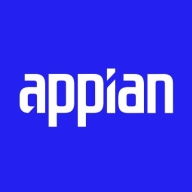

Appian and Axon Ivy compete in the business process management software category. Appian seems to have the upper hand due to its comprehensive feature suite and integration flexibility, although it comes at a higher cost compared to Axon Ivy, which is attractive for cost-sensitive projects.
Features: Appian offers comprehensive automation tools, user-friendly collaboration features, and extensive integration capabilities. Axon Ivy stands out with flexible process management, case management solutions, and effective customizations.
Ease of Deployment and Customer Service: Axon Ivy's deployment is straightforward with responsive customer service, making it an attractive choice for rapid implementations. Appian provides extensive deployment options but demands a higher initial configuration effort. Customer service is robust for both, but Axon Ivy gains an edge with personalized support and shorter deployment timeframes.
Pricing and ROI: Appian has higher setup costs but this investment correlates with substantial returns due to its comprehensive feature set. Axon Ivy offers a more budget-friendly initial setup with quicker ROI, appealing to organizations seeking efficient solutions with restrained budgets.
| Product | Market Share (%) |
|---|---|
| Appian | 3.7% |
| Axon Ivy | 0.6% |
| Other | 95.7% |

| Company Size | Count |
|---|---|
| Small Business | 20 |
| Midsize Enterprise | 9 |
| Large Enterprise | 42 |
Appian is a unified low-code platform and solution used by businesses to build enterprise applications and workflows. This product adapts to the needs of clients and the technologies they are already using to combine their data in a single workflow and maximize resources. The platform has four main components through which it transforms the work process for companies of various sizes. They are:
Appian is utilized across a diverse set of industries, including automotive and manufacturing, energy and utilities, education, financial services, telecom and media, transportation, retail, insurance, healthcare, and life sciences. The most frequent use cases of Appian are customer journey, governance, risk and compliance, operational efficiency, supply chain, distributed order management, and environmental, social, and governance (ESG) management.
Appian Features
Appian has various features that allow users to create solutions for their businesses. These features can be separated into a few groups according to function, including automation, low-code application development, and integrations and data. Some of the most frequently used features of Appian include:
Appian Benefits
The benefits of using Appian include:
Reviews from Real Users
A practice leader - digital process automation at a computer software company values Appian highly because the product is easy to develop, low-code, and has a good user interface.
Alan G., an advisory board member at Codecon VR, Appian offers a clear application life cycle, easy to learn documentation, and comes with a fundamentals course.
At Axon Ivy, we help solve one of the largest problems organizations face today – streamlining inefficient business processes.
Executives need to plan and execute the successful digital transformation of their businesses. Department heads need fast and flexible support for efficient processes. IT managers need an agile tool to orchestrate end-to-end business processes.
We monitor all Business Process Management (BPM) reviews to prevent fraudulent reviews and keep review quality high. We do not post reviews by company employees or direct competitors. We validate each review for authenticity via cross-reference with LinkedIn, and personal follow-up with the reviewer when necessary.